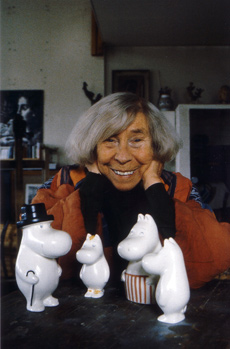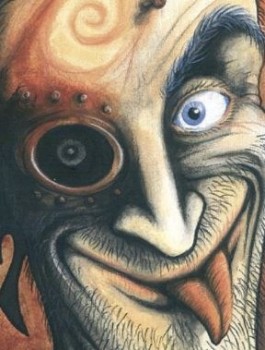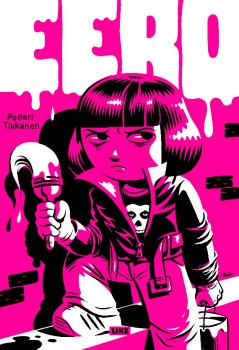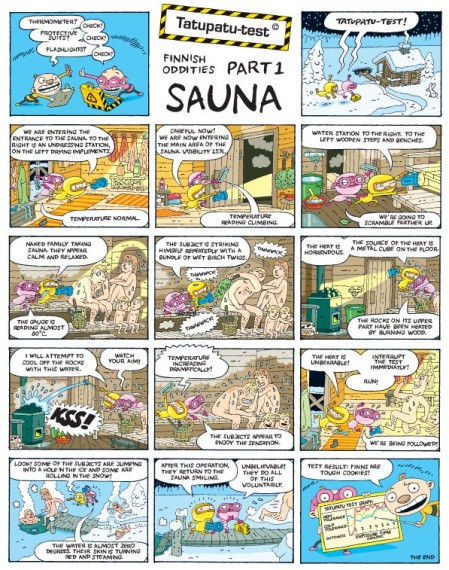Tag: comics
Serial fun, or comics celebrated
24 January 2011 | In the news
The art of comics celebrates its first centenary in Finland this year. The first Finnish picture story was a book called Professori Itikaisen tutkimusretki (‘Professor Itikainen’s expedition’, WSOY), by Ilmari Vainio, published in 1911; see our post on the Books from Finland website.
By the way, comics in Finnish is sarjakuva, ‘serial picture’, covering the modern usage of ‘comics’ – including serious, graphically impressive stuff such as the newish genre of the graphic novel.
The annual Helsinki Comics Festival, organised by Finnish Comics Society (founded 1971), is the biggest event in the field in northern Europe; this year’s festival will take place in September. In 2011 comics exhibitions will take place at the Finnish Design Museum, the Finnish Post Museum and the National Library of Finland.
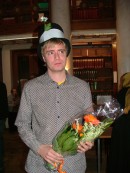
Tommi Musturi. Photo: the Finnish Comics Society
The Society awarded its Puupää prize 2011 to Tommi Musturi (born 1975) – take a look at an extract from his Walking with Samuel which we ran on the Books from Finland website in May 2010.
Among Musturi’s publications are ten anthologies entitled Glömp; he has also worked for Kuti magazine and Huuda Huuda publisher. The jury remarked, in particular, on their appreciation of Musturi’s highly original, often wordless, stories and their graphic brilliance.
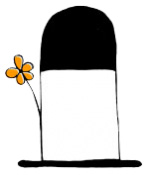
The prize: Puupää's hat
The prize is not money but a honorary hat, and is named after a classic Finnish cartoon character, Pekka Puupää (‘Pete Blockhead’), created by Ola Fogelberg and his daughter Toto. The Puupää comic books were published between 1925 and 1975, and some of the stories were made into film.
Hip hip hurray, Moomins!
22 October 2010 | This 'n' that
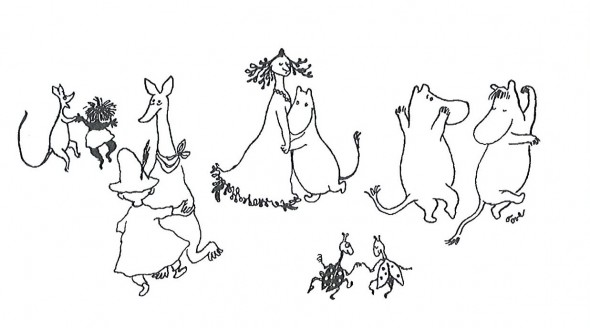
Partying in Moomin Valley: Moomintroll (second from right) dancing through the night with the Snork Maiden (from Tove Jansson’s second Moomin book, Kometjakten, Comet in Moominland, 1946)
The Moomins, those sympathetic, rotund white creatures, and their friends in Moomin Valley celebrate their 65th birthday in 2010.
Tove Jansson published her first illustrated Moomin book, Småtrollen och den stora översvämningen (‘The little trolls and the big flood’) in 1945. In the 1950s the inhabitants of Moomin Valley became increasingly popular both in Finland and abroad, and translations began to appear – as did the first Moomin merchandise in the shops.
Jansson later confessed that she eventually had begun to hate her troll – but luckily she managed to revise her writing, and the Moomin books became more serious and philosophical, yet retaining their delicious humour and mild anarchism. The last of the nine storybooks, Moominvalley in November, appeared in 1970, after which Jansson wrote novels and short stories for adults.
Tove Jansson (1914–2001) was a painter, caricaturist, comic strip artist, illustrator and author of books for both children and adults. Her Moomin comic strips were published in the daily paper the London Evening News between 1954 and 1974; from 1960 onwards the strips were written and illustrated by Tove’s brother Lars Jansson (1926–2000).
Tove’s niece, Sophia Jansson (born 1962) now runs Moomin Characters Ltd as its artistic director and majority shareholder. (The company’s latest turnover was 3,6 million euros).
For the ever-growing fandom of Jansson there is a delightful biography of Tove (click ‘English’) and her family on the site, complete with pictures, video clips and texts.
The world now knows Moomins; the books have been translated into 40 languages. The London Children’s Film Festival in October 2010 featured the film Moomins and the Comet Chase in 3D, with a soundtrack by the Icelandic artist Björk. An exhibition celebrating 65 years of the Moomins (from 23 October to 15 January 2011) at the Bury Art Gallery in Greater Manchester presented Jansson’s illustrations of Moominvalley and its inhabitants.
In association with several commercial partners in the Nordic countries Moomin Characters launched a year-long campaign collecting funds to be donated to the World Wildlife Foundation for the protection of the Baltic Sea. Tove Jansson lived by the Baltic all her life – she spent most of her summers on a small barren island called Klovharu – and the sea featured strongly in her books for both children and adults.
Child of chaos
10 September 2010 | Comics, Fiction
A cornucopia of exciting plots and strange characters, the mythic epic Kalevala has inspired innumerable artists since its first publication in the 1830s. A recent interpretation of the story of an extremely tragic hero named Kullervo takes the form of a graphic novel by Gene Kurkijärvi: his urban Kullervo lives in a grim environment – not unlike Helsinki, but carrying with dystopian overtones – where the heroes and/or villains are steely androids and hairy weirdos who shoot drugs and use foul language. This 21st-century Kullervo is a surrealist cyberpunk tragedy – laced with pitch-black comedy.
Extracts from the graphic novel Kullervo by Gene Kurkijärvi (Like, 2009; captions translated by Owen Witesman) More…
Song without words
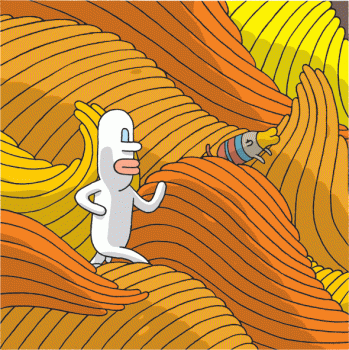
The episode we feature here is from Samuelin matkassa (‘Walking with Samuel’, Huuda Huuda, 2009; the book has been also published in Germany, Belgium, Sweden and Portugal)
Our lives are now more surrounded with images – moving or still, narratives or icons, emblems and symbols – than ever before – but do we know how to interpret them? How well can we read pictures?
Try this: Samuel is a cartoon character, created by Tommi Musturi, who wanders through time and a fantastically colourful universe of his own. His story is told in pictures, not words – and the details speak volumes. It tells, as you will find if you ‘read’ it carefully, about friendship between man and… another creature. More…
Comic prize
26 March 2010 | In the news
Sarjakuva-Finlandia, worth €5,000, is the name of a prize created in 2007 for Finnish graphic novels or comic books. (Sarjakuva, literally ‘serial picture’, refers to both comic strips and books as well as graphic novels.)
It is awarded annually at the Tampere comics festival (and has nothing to do with the Finlandia prizes for literature, awarded by the Finnish Book Foundation).
Out of 56 contestants, ten made it into the final run, and the winner, Eero, by Petteri Tikkanen, was chosen by the thriller writer Matti Rönkä.
Petteri Tikkanen (born 1975) is a graphic artist who has published several books. In his previous graphic novels about a girl named Kanerva, Eero has appeared as her friend. Now Eero is the central character, and it seems childhood is over. Kanerva likes to chill out with her girlfriends only – what is a boy to do?
Funny ha ha?
3 March 2010 | This 'n' that
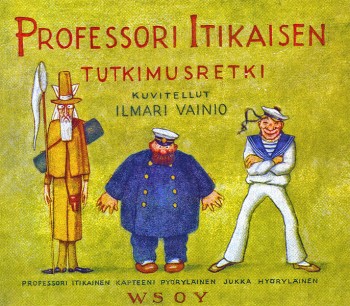 Comic books, graphic novels: the popularity of stories in pictures keeps on growing everywhere – and they may or not may be ‘comical’.
Comic books, graphic novels: the popularity of stories in pictures keeps on growing everywhere – and they may or not may be ‘comical’.
In Finland, sarjakuva (lit. serial picture) will celebrate its 100th anniversary in 2011. The first Finnish picture story, Professori Itikaisen tutkimusretki (‘Professor Itikainen’s expedition’, WSOY), by Ilmari Vainio, was published in 1911.
Ilmari Vainio (1892–1955) was a customs official who later also published two fairy tales and two handbooks for boy scouts. Professor Itikainen is a scientist who sets out on the sea and then finds himself, together with two brave seamen, facing various dangers in Africa, China and on the North Pole. A happy ending ensues in the form of safe arrival back in Helsinki on page 48. More…
Selling best
15 October 2009 | This 'n' that
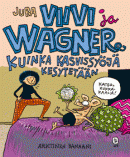 Appearing at number two on the Finnish fiction best-seller in August was part 12 of Juba Tuomola’s Viivi & Wagner comic-strip series, entitled Kuinka kasvissyöjä kesytetään (‘The taming of the vegetarian’, Arktinen Banaani).
Appearing at number two on the Finnish fiction best-seller in August was part 12 of Juba Tuomola’s Viivi & Wagner comic-strip series, entitled Kuinka kasvissyöjä kesytetään (‘The taming of the vegetarian’, Arktinen Banaani).
With its hero, the (literal) chauvinist pig Wagner and his (human) girlfriend Viivi, the series has long been immensely popular in Finland but, unaccountably, the mixed-species duo hasn’t yet made its international breakthrough… As we wait for Viivi and Wagner to conquer the world, here’s a sneak preview (sorry, no English subtitles on the web page of the Helsingin Sanomat newspaper where the daily strip is reprinted!). More…
Funny stuff
1 April 2009 | In the news
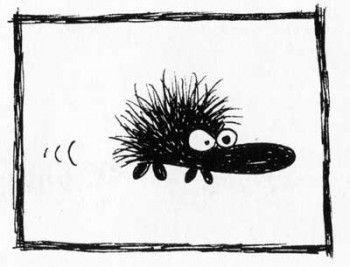
Milla Paloniemi's swearing hedgehog
For the first time, comic books rule the latest bestsellers list of Finnish fiction.
A cartoon series called Fingerpori by Pertti Jarla evidently tickles the Finnish funny bone, as three of his collections occupy the second, sixth and eighth places on the February top ten list, compiled by the Booksellers’ Association of Finland. More…

